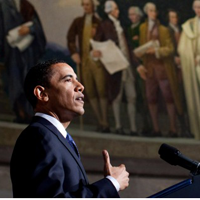A central theme of Barack Obama's 2008 presidential campaign was the need to revitalize the institutions of governance for 21st-century problems. "We cannot meet 21st-century challenges with a 20th-century bureaucracy," he declared in one notable stump speech, and the sentiment was repeated throughout his campaign. Once in office, President Obama made the same claim regarding international order and governance. The 2010 National Security Strategy (NSS) (.pdf) acknowledged that in a world facing transnational threats, and one where "new centers of influence" would shape diplomatic options, international cooperation was a necessity. But it recognized that outdated institutions are as much an obstacle for international governance as outdated financial rules are an impediment to managing the global economy. The NSS asserted that, "As influence extends to more countries and capitals, we will build new and deeper partnerships in every region, and strengthen international standards and institutions."
Two years in, the Obama administration has made good headway on the first part of that goal. The passage of New START capped a successful two-year effort to reforge the relationship with Russia, and shows that Washington is, after all, capable of mustering bipartisan support for international cooperation. As for China, for all of the sturm und drang in the bilateral relationship, Washington and Beijing worked in close cooperation to respond to the global financial crisis and set up new tools for global financial regulation. And just last month, the U.S. and China came together to push through governance reform of the IMF, despite resistance from America's European allies. The process of forging a strategic alliance with India, begun under the Clinton administration and deepened by the Bush administration, has been taken to the next level with Obama's November 2010 visit and the U.S. endorsement of India's claim for a permanent seat on the U.N. Security Council. Relations were more turbulent with President Luiz Inacio Lula da Silva's Brazil, but with new Brazilian leadership now in place, a broader strategic and economic relationship looks set to solidify. Most importantly, the administration moved rapidly to recognize the G-20 Leaders Summit as "the pre-eminent forum" for international economic cooperation -- signaling the new emerging powers' arrival at global governance's top table.
The challenge now is to pick up the second part of the sentence: " . . . and strengthen international standards and institutions." The NSS itself gives guidance as to where: for countering violent extremism and insurgency, sustaining the global economy, stopping the spread of nuclear weapons, tackling climate change and managing conflict. That familiar list also includes a refreshing addition: "helping countries feed themselves and care for their sick" -- a humane addition from a historically humane country.

